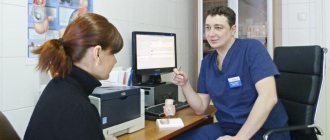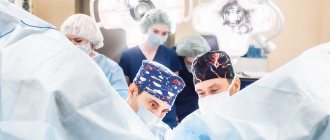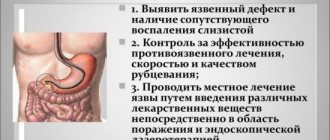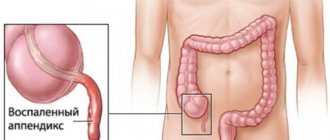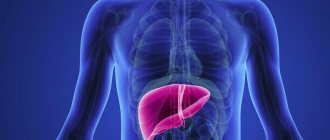Any discomfort associated with the perianal area significantly reduces the quality of life of any person.
At the first symptoms (bloody discharge during bowel movements, pain, itching, burning in the anal canal, etc.), a visit to the proctologist is a necessary action. It is this medical specialist who deals with pathologies in a delicate part of the body.
Discard unnecessary embarrassment, because a visit to a proctologist will save you from more serious problems that may arise as a result of advanced forms of proctological diseases.
Hemorrhoids and pregnancy
An important component in the structure of female hemorrhoids is pregnancy and childbirth. What explains this phenomenon? The fact is that during pregnancy the uterus increases significantly in size, especially in the second half of the term. By the time of birth, the uterus occupies most of the abdominal cavity and displaces the stomach, liver, and loops of the small and large intestines upward. Meanwhile, the rectum remains in the same position and is pressed down by the uterus. Due to the pressure of the uterus, bowel movements are complicated, constipation occurs, which in itself leads to hemorrhoids. In addition, venous vessels are subjected to compression, blood stagnation occurs in the pelvis, and the number of cavernous bodies increases. As a result of these processes, hemorrhoids also appear.
Hemorrhoids can reveal themselves during childbirth or immediately after them, when, due to pushing, the pressure inside the abdomen, in the veins of the pelvis and rectum increases sharply. After childbirth, the strong pressure disappears, but the manifestations of hemorrhoids do not always go away, since a circulatory disorder has already occurred in the vessels.
Female factor
One of the reasons for the occurrence of hemorrhoids is... women belonging to their own gender, namely menstruation. Some women experience symptoms of hemorrhoids: discomfort, sensation of a foreign body, pain, blood in the anus, bleeding during bowel movements, which occur during menstruation. This is explained by the fact that during “critical days” the flow of blood to the pelvic organs increases, the hemorrhoids become overfilled with blood, which leads to an exacerbation of the disease.
Make an appointment
Inspection stages
The direct examination by a proctologist includes four necessary stages. They follow each other and don't take much time. The stages are:
- visual examination of the anus and adjacent areas of the body;
- qualified digital examination of the rectum. Precisely qualified is a very appropriate definition (and my teacher, Professor A.V. Vorobey, often uses it).
- sigmoidoscopy – examination of the rectum and lower part of the sigmoid colon up to 25-30 cm;
- anoscopy – examination to a depth of 4-6 cm – this is the part of the body with problems that patients most often address.
Why so many things? This series of studies allows you to most accurately establish the picture of the patient’s health in a given part of the body.
Nutrition
Patients with hemorrhoids, and everyone who strives to prevent proctological diseases, are prescribed the correct diet. Namely, one that would lead to daily easy bowel movements. It is desirable that defecation should take place easily, at the same time, in a home environment, the stool should be elastic, soft, and the act of defecation should evoke only pleasant emotions.
The most important role in achieving such a bowel movement is played by the diet. Including a diet with the exclusion of spicy, peppery dishes. It is known that long-term consumption of such food leads to excessive blood filling and irritation of the mucous membrane of the gastrointestinal tract. As a result, congestion develops in the vessels of the submucosal layer and hemorrhoids. It is widely known that the peoples of the Caucasus, whose cuisine is rich in spicy and peppery dishes, suffer from coloproctological diseases more often than others and at a younger age.
Fast food, dry food, monotonous food require increased work of the digestive system. Over time, she gets tired, and as a result, constipation and chronic inflammatory changes in the intestines occur. All this does not pass without a trace, it contributes to the disruption of blood flow from the veins of the rectum and can cause hemorrhoids and its exacerbations. It is no longer news that nutrition should be balanced. And this concept includes not only the correct ratio of proteins, fats, carbohydrates, vitamins and microelements, but also something else. The most important point for the prevention of proctological diseases is the regular consumption of foods containing indigestible plant fibers and fiber. These are any fresh vegetables and fruits, greens, beans, oats, nuts, seeds, citrus fruits, berries, bran. Lack of fiber in food leads to a decrease in the amount of feces, intestinal weakness and, ultimately, constipation. Severe straining during bowel movements with stool retention also contributes to stagnation of blood in the veins of the rectum and can become one of the reasons for the development of hemorrhoids.
It is impossible not to say a few words about the effect of alcohol on the occurrence of hemorrhoids. To do this, let us explain the relationship between drinking and illness. When alcohol, which is contained in alcohol and is a very aggressive substance, enters the human body, it greatly irritates the mucous membrane of the stomach and intestines, causing persistent reflex vasodilation, spreading to all parts of the digestive tract, including the rectum. Vasodilation leads to stagnation of blood in the hemorrhoids and their inflammation. Doctors know that many of their patients, after drinking alcohol, suffer more not from a hangover, but from exacerbation of hemorrhoids and pain in the anus.
What does a proctologist treat, and how to prepare for the examination? Indications for visiting a doctor at the MEDSI Clinic
Table of contents
- Proctologist specialization
- What diseases does the doctor treat in women?
- What diseases does it treat in men?
- How to prepare for the examination?
- How is the inspection carried out?
- Examination of children by a proctologist
- Who treats colitis – a proctologist or a gastroenterologist?
- Advantages of visiting a proctologist at MEDSI
A proctologist is a specialist who treats diseases of the rectum, colon and anus. You should contact this doctor immediately after detecting the first signs of the disease. MEDSI clinics employ experienced specialists who provide support to patients with a wide variety of proctological problems.
Proctologist specialization
A proctologist treats infectious, parasitic, congenital, inflammatory and oncological diseases of the intestines, colon and nearby tissues. The specialist examines patients and collects medical history. You can also get advice on diseases from a professional.
Doctors have a therapeutic or surgical profile. Doctors of the first type carry out only conservative therapy, while doctors of the second type carry out surgical interventions.
What diseases does the doctor treat in women?
A proctologist treats:
- Hemorrhoids. This disease occurs due to varicose veins in the rectum and leads to the development of hemorrhoidal cones that protrude from the anus, causing discomfort, bleeding and pain.
- Anal fissures. This pathology occurs as a result of damage to the walls of the rectum.
- Polyps in the colon. This pathology belongs to the category of benign formations and is hereditary in nature.
- Paraproctitis. These diseases lead to inflammation of the perirectal tissues and the formation of fistulas
- Helminthic infestations
- Cancerous tumors
Women should consult a doctor if they detect the first signs of any of the listed pathologies.
These include:
- Constipation or fecal incontinence
- Pain in the anus
- Anal bleeding
- Discharge from the anus of mucus and pus
- Bloating
What diseases does it treat in men?
Proctologists treat the same diseases in men as in women.
You should consult a specialist for hemorrhoids, anal fissures, polyps, proctitis and paraproctitis. It is important to understand that only with timely diagnosis, diagnosis and treatment can you count on the rapid elimination of not only the symptoms of diseases, but also their causes. By consulting a doctor in the early stages of the development of pathology, the patient receives adequate conservative therapy, which avoids the need for surgical intervention.
How to prepare for the examination?
Preparing for an examination by a proctologist is quite simple. You will not have to go on a special diet or do cleansing enemas.
Follow these guidelines:
- It is recommended to have a bowel movement before going to the doctor. If necessary, you can take a laxative. This will allow the specialist to make a preliminary diagnosis
- The day before your appointment with a proctologist, you should exclude from your diet foods that stimulate increased gas formation.
- Immediately before going to the doctor, carry out standard hygiene procedures (washing with soap)
- Try to calm down and not worry. There is nothing scary or shameful about being examined by a proctologist. The doctor does his job
How is the inspection carried out?
An examination by a proctologist takes place in several stages:
- Taking anamnesis
and listening to patient complaints - Primary examination
. It is carried out by palpation. The organs are palpated by the doctor through the abdominal wall and through the anus. Such an examination allows you to assess the condition of the anal canal and nearby parts of the intestine. Diagnostics by palpation makes it possible to detect pathological formations and damage to the walls - Anoscopy
. To carry out this examination, an anoscope is used - a special device in the form of a hollow tube with a lighting tip and an adapter, which allows for a visual inspection of the walls of the rectum. For diagnosis, the patient lies on his side and pulls his legs towards his stomach. The device is inserted into the anus and allows the doctor to see all the changes. In addition, during anoscopy, material is collected for biopsy. - Sigmoidoscopy
. This examination is carried out using a sigmoidoscope. Diagnostics is aimed at assessing the rectum and sigmoid colon, as well as the condition of the mucous membranes at a depth of 40 cm. A sigmoidoscope is a fiber-optic tube with a lighting device. For diagnosis, the patient is asked to kneel and elbow. This ensures the tool penetrates to the desired depth - Colonoscopy
. This examination belongs to the category of endoscopic and is one of the most informative. With this diagnosis, tumors, ulcerative colitis and Crohn's disease can be detected. The procedure can be not only diagnostic, but also therapeutic. Colonoscopy is also prescribed to stop bleeding, remove small benign tumors and remove foreign bodies from the rectum. Colonoscopy can be performed under anesthesia - Laboratory research
. Patients often donate blood and stool
If dangerous pathologies are suspected, the following is additionally prescribed:
- Computed tomography
- Ozonation of the intestines
- Ultrasound
- Colon hydrotherapy
Examination of children by a proctologist
If your child complains of pain during bowel movements or experiences other proctological problems, you should immediately make an appointment with a doctor. As a rule, the diagnosis of diseases in children is carried out using the palpation technique. Instrumental methods are not used due to the too small size of the rectum. Additionally, the doctor prescribes ultrasound, CT and other examinations that are non-invasive.
Who treats colitis – a proctologist or a gastroenterologist?
Proctologists treat colitis, as well as other diseases of the lower digestive tract. They carry out both an initial examination and consultation, as well as a full diagnosis and further therapy. If necessary, an additional examination by a gastroenterologist is prescribed. If the situation is complex and confusing, doctors consult and decide on the treatment of the pathology together.
Advantages of visiting a proctologist at MEDSI
- Using the most modern European diagnostic and treatment protocols
- Minimizing psychological uncertainty, feelings of fear and anxiety in patients
- Experienced doctors with many years of experience. Our proctologists in Moscow regularly improve their qualifications and undergo internships in the world's leading clinics
- Using a range of modern diagnostic methods: laboratory tests, endoscopy of the anal canal and rectum. MRI of the pelvis and abdominal cavity
- The use of minimally invasive endoscopic and surgical techniques for the treatment of diseases of the colon, anal canal and perineum: sclerotherapy, infrared photocoagulation, dearterization of nodes, laser operations
- No queues and the ability to make an appointment with a doctor at a convenient time
To make an appointment with a proctologist, just call the number: +7 ((495) 152-47-53.
Stages of hemorrhoids and its treatment
In most cases, treatment of hemorrhoids is possible without surgery and long-term rehabilitation! Modern minimally invasive techniques allow you to deal with hemorrhoids quickly, without pain and without a long recovery period.
Treatment of hemorrhoids is a more radical task, the longer the age of the existing disease. In total, hemorrhoids have 4 stages of development. Signs of stage 1 are practically absent or appear weakly and infrequently. This is bloating, pain during bowel movements, mild bleeding when emptying the intestines. The 2nd stage is characterized by slight bleeding, drops of blood on toilet paper, pain before and after defecation, itching and burning of the anus, prolapse of hemorrhoids with abdominal tension. At the 2nd stage of hemorrhoids, the nodes retract on their own. Treatment at stages 1 and 2 is conservative: diet, drugs to normalize stool, suppositories, ointments and combinations thereof, phlebotropic drugs. At the 3rd stage, the nodes fall out with each bowel movement, they no longer retract themselves, and they can only be set by hand. Moreover, in the future the nodes fall out even with slight tension or heavy lifting. At stage 4, the nodes fall out even in a calm state, thrombosis develops, and frequent heavy bleeding begins, which can lead to anemia. Late stages of hemorrhoids require invasive treatment methods, there are many of them today: infrared photocoagulation, injection sclerotherapy, ligation with latex rings, hemorrhoidectomy, surgery using Professor Longo’s method. Note that several years may pass between the first and fourth stages.
Rehabilitation after treatment is simple and takes several days, and bed rest is not required in the postoperative days.
Other articles by the author
- Treatment of internal hemorrhoids
- Hemorrhoidal thrombosis
- Seamless excision of anal fimbria using the Surgitron method
- Anococcygeus pain syndrome
- Condylomas
- Hemorrhoids
- Hemorrhoids in women
- Itching and burning in the anus
Preparation for examination on the chair
⚠ A girl should not go to the doctor during her period unless absolutely necessary, as this will prevent the specialist from fully examining her and obtaining the necessary information. An exception may be if menstruation is accompanied by unpleasant symptoms, is very heavy or prolonged, or comes earlier or later than due. In this case, visiting a doctor should be mandatory. In other situations, it is better to go to the gynecologist 2-5 days after the end of your period.
⚠ Before going to the clinic, you need to take a shower and put on fresh underwear. At the same time, there is no need to actively wash yourself, otherwise the doctor will not be able to assess the state of the vaginal microflora. You should absolutely not douche before the examination, as well as use special intimate perfumes or eau de toilette.
⚠ A day or two before going to the doctor, you should stop using medicinal suppositories or sprays. If you were treated with antibiotics, you can visit the doctor 7-10 days after the end of the course.
⚠ As for shaving hair in the crotch, this procedure is not mandatory. However, everyone knows that cutting short hair or epilating the deep bikini area provides better cleanliness in this area. Before entering the examination room, it is very important to empty not only the bladder, but also the intestines, since the gynecologist checks virgins through the anus.
